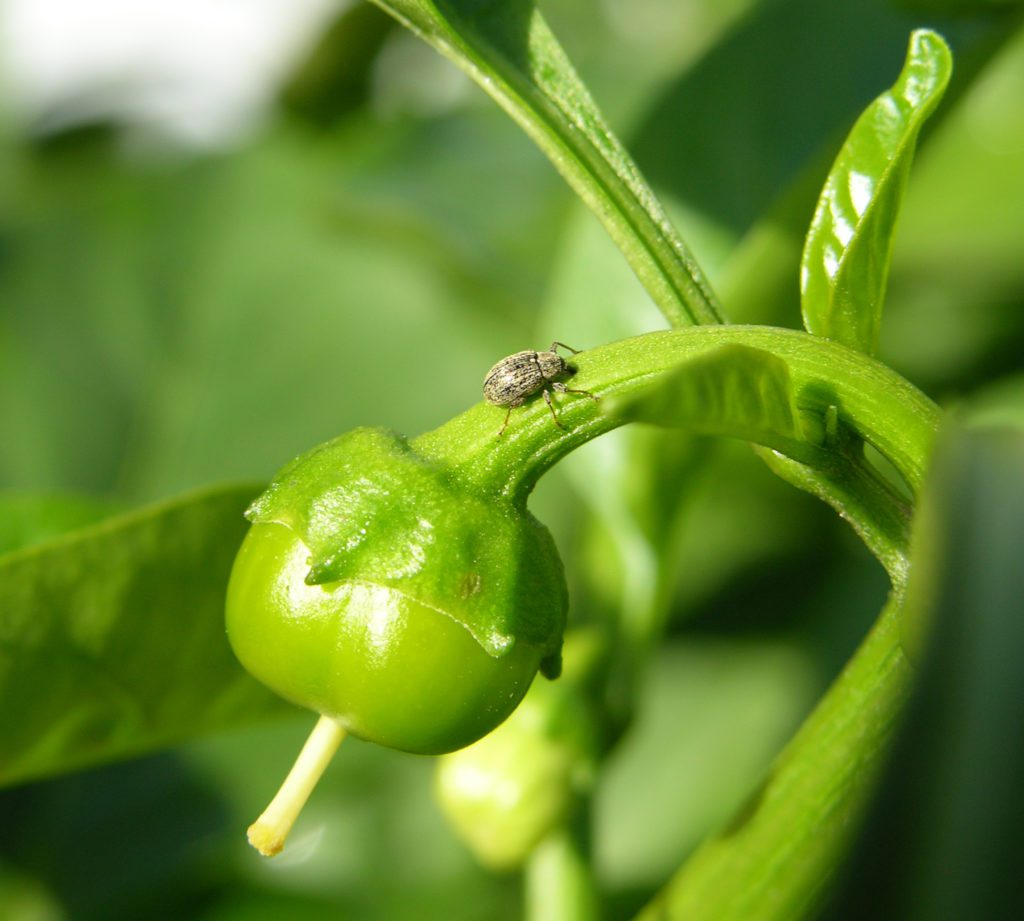

Feb 18, 2021Weevil Control Requires Vigilance
Success entails spraying and post-harvest management
{Sponsored} Effectively controlling pepper weevil requires a comprehensive year-round plan that includes routine insecticide sprays, monitoring and post-harvest crop destruction.
“This is not a pest you want to get behind and then have to catch up with,” says Alton “Stormy” Sparks, Extension entomologist at the University of Georgia, to virtual attendees at the 2021 Southeast Regional Fruit and Vegetable Conference.
Vydate® L insecticide/nematicide can be a grower’s first line of defense against pepper weevil. Vigorous growth and higher yields are possible with a foliar or drip application of Vydate L, beginning at first flower.
In two years of pepper weevil trapping studies, Sparks and his University of Georgia colleagues averaged 200 weevils per trap per week.
“The goal is to reach zero,” Sparks says. “Our populations do drop off during the winter, but we are not zeroing out. We are obviously overwintering weevils and are starting the spring with weevils in the field. They are not coming up from Florida. We are maintaining populations throughout the year, which is not good news.”
Sparks emphasizes the importance of focusing preventive control measures on adult weevils as that is the only stage that can be exposed to insecticides.
Vydate L consistently leads the pack of insecticide options available to growers in the fight against adult pepper weevils.
In the University of Georgia study, Vydate L sprayed at a rate of 4 pints per acre performed better than other commercially available insecticides and statistically better than the untreated check.
“The products that we already know are good are continuing to perform well against adult weevils,” Sparks says.
In the 2020 study, Vydate L outperformed several competing treatments when pepper weevil mortality was documented at both 24 hours and 72 hours after treatment.
Vydate L is a broad-spectrum insecticide/nematicide reliably controlling key pests in vegetable crops including aphids, mites, thrips, leafminers, weevils, leafhoppers and several nematode species. With both foliar translaminar and soil systemic activity for top-down and roots-up control of damaging insects, yield-robbing pests and nematodes experience reduced feeding, movement, reproduction and hatching.
What’s more, Vydate L is in the carbamate family, providing increased plant health and giving growers an effective rotational partner in resistance management programs.
Because pepper weevil requires fruiting forms in the field for reproduction, early season populations are not likely causing substantial crop damage. Before the plant puts on fruit, pepper weevil populations can survive on foliage feeding, but cannot reproduce.
If pepper weevil populations are present in a field, insecticide sprays should begin at the very first indication of any kind of fruiting form.
Sparks recommends spraying at no more than five-day intervals. “A once-a-week spray interval with pepper weevil simply will not work for control. It should be a maximum of five days, even under low pressure,” he says.
And once harvest is complete, Sparks says it is imperative that infested crops be destroyed. “Don’t let weevils reproduce at the end of the season. The more food they have, the longer they can survive.”
Post-harvest crop destruction is especially important if a spring crop is followed by a fall crop. During the spring and summer months, weevils can’t live very long without food available. That is not the case during the winter months when they can live longer even without available food sources.
“With crop destruction, we are trying to prevent carryover from crop to crop,” Sparks says.
- To learn more about how Vydate L can help manage pepper weevil and other vegetable pests on your farm, visit VydateL.Corteva.US.
™ ®Trademarks of Corteva Agriscience and its affiliated companies. Vydate® L is a Restricted Use Pesticide. Vydate L is not registered for sale or use in all states. Contact your state pesticide regulatory agency to determine if a product is registered for sale or use in your state. Always read and follow label directions.
© 2021 Corteva. CA14-359-030 (03/21) BR CAAG1DELE051














